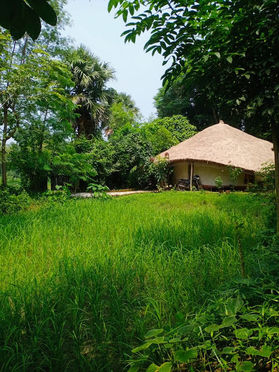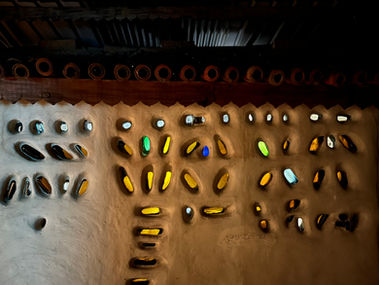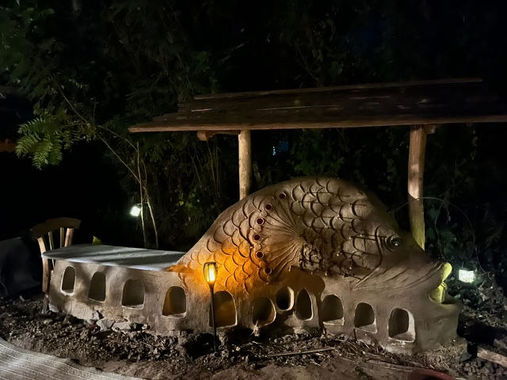"Each flower begins as a bud, blossoms, and wilts one day. But the fragrance always remains" - From the Santhal tribal song Baha Bagan
This workshop will enable you to learn the delightful art of botanical printing. All of nature is full of gifts to share and we will learn how to identify specific plants whose leaves and flowers can be imprinted on natural fabrics and then go through the process of printing in a step-by-step fashion.

THIS PROGRAM IS FOR YOU IF…
YOU LOVE TO CREATE SOMETHING BEAUTIFUL FROM NATURE

You want to learn the art of botanical printing to create absolutely unique and beautiful prints on natural cloth. You love to collect flowers, leaves and stems, and observe how they transform during the printing process.

YOU ENJOY HANDS-ON LEARNING
You enjoy learning-by-doing in a group, while being guided by self-taught artists who have dedicated themselves to the art of botanical printing, have learnt by experimentation, and are keen to pass on their knowledge to you.
YOU LOVE IMMERSING IN NATURE AND WITH AN INDIGENOUS TRIBAL CULTURE

You thrive in the midst of nature, on a regenerative farm with natural buildings, and you would love to immerse in a nature-connected tribal culture, their food and ways of living.
MEET YOUR TEACHERS
Swati and Boot are Santiniketan-based artisans who are self-made and self-taught. They are lovers of nature and it's rhythms and do their work as a labour of love. From wood- and stone-carving to sketching, art direction for films, nature-based tourism, they have been fascinated with the art of botanical printing for the last six years. They have learnt through meticulous experimentation with various types of leaves, flowers, roots, and barks. Preparation of one piece of cloth takes up to fifteen days of careful and patient work, and each cloth is distinct and impossible to replicate. They are now keen to transfer their knowledge through workshops like this one.

WHAT YOU CAN EXPECT
You will be taught the process of botanical printing in a systematic, stepwise fashion, and will also receive a written manual that you can take back home as a resource.

PREPARING THE FABRIC
We'll learn to scour the fabric to remove impurities that may prevent the print from emerging. Following that, we will mordant the fabric using metal ionic solutions that will enable the pigment from the leaves to bond with the fabric.
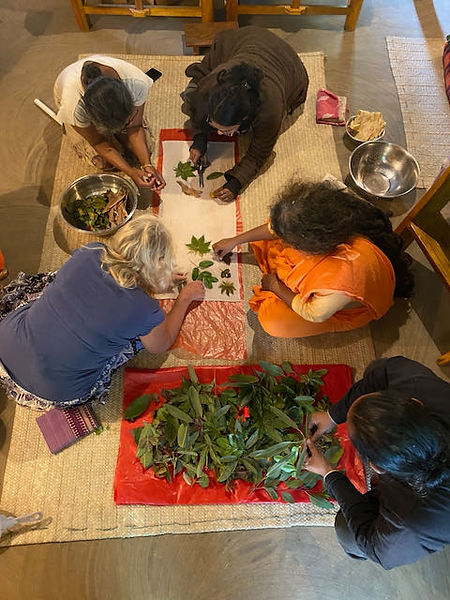

COLLECTING LEAVES AND BUNDLING
We'll explore the Dularia plot and nearby areas to identify trees and collect the foliage. We will then learn how to bundle the cloth and steam it with the leaves to obtain the print.

FINAL WASH BEFORE USE
We'll teach you how to wash the cloth and starch it in an appropriate manner so that the print remains and doesn't fade.
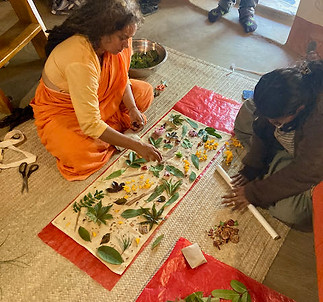
"This workshop was a wonderful, creative, and immersive experience! I enjoyed each moment of it."
Parvathy Baul, Baul Musician
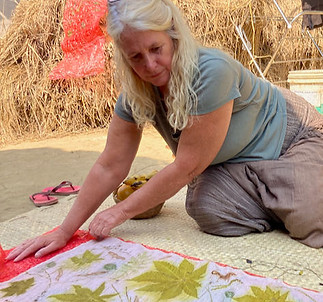
"Dularia was a beautiful setting for hands-on learning of this beautiful craft. I went home and started my botanical printing journey right away!"
Kisty Milward, Founder of non-profit Suchana
FOOD & ACCOMMODATION
We have 3 options for accommodation:
1
Our gorgeous Earthhome (can be shared among four people, available on a first-come, first serve basis)
2
In a tent with bedding provided, pitched in the middle of our food forest. Shared showers and toilets are available on the premises.
3
Any of the surrounding guest-houses. Two options are Panchabati Resort ( 850 m away from Dularia) or Khoai Village Resort (2.7 km away from Dularia).
Meals consist of wholesome vegetarian food containing fresh vegetables and greens harvested from our farm, and cooked on our wood-fired stove in the Santhal tribal or local Bengali tradition. We serve two big meals plus fruit, tea and snacks to keep you well-fed and energized for the tasks of the day.

PRACTICAL DETAILS
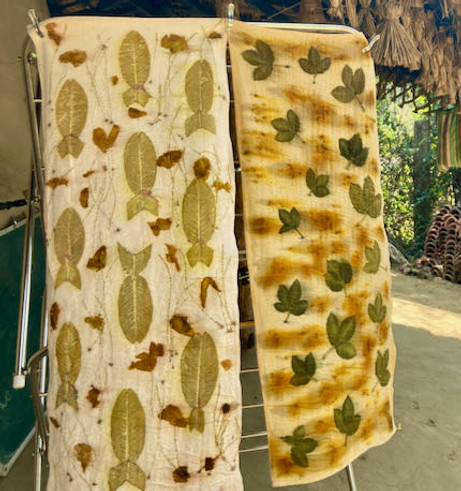
DATES
Oct 31 - Nov 02, 2025
Arrival is suggested on Oct 31, 2025 by 9am latest, and departure is at 5pm on Nov 2, 2025.
Last date for registration: Oct 24, 2025
PARTICIPANTS
Min 4 - Max 8
Book your spot soon as limited places are available! This is an intimate workshop where you'll meet like-minded people and get plenty of personal attention from the instructors.
COST
Tuition fees: INR 15,000/-
Includes a pre-made printing kit, detailed manual, taxes, excludes food & accommodation, to book your spot, a non-refundable deposit of INR 5,000/- will be required.
Food: INR 2,700/-
Includes all meals. Vegetarian meals using local tribal and Bengali recipes will be prepared using organic ingredients from the farm.
Accommodation:
-
In a tent with bedding provided: 900/-
-
Shared stay in our Earthhome (only 4 spots available, first-come, first serve basis): 3,000/-
-
For guesthouses outside Dularia, please enquire with them directly.
All inclusive prices, including food and accommodation:
-
In a tent: 18,600/-
-
In our Earthhome: 20,700/-
-
In the homestay of your choice: 17,700/- plus accommodation expenses.
DAILY SCHEDULE
8:00 - 8:30: Breakfast with tea/coffee.
8:30 - 12:30: Morning session. These sessions will cover the core content of the course. All content will be hands-on. Tea/coffee plus snack will be served.
12:30 - 14:30: Lunch and personal time.
14:30 - 17:00: Afternoon session. These sessions will cover the core content of the course. All content will be hands-on. Afternoon tea & snacks will be served.
18:00 - 19:00: Dinner
19:00 - 21:00: Bon-fire, songs, sharing, relaxation. Participation is completely optional.
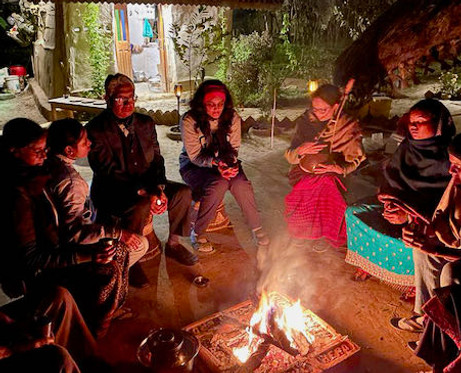
WHERE WE'RE LOCATED
Dularia is located in a rural setting, just ten kilometers away from Shantiniketan, which has been recently recognised as a UNESCO world heritage site for its historical and cultural value. This makes it all the more attractive to visit Dularia and to take a few days extra to visit the surroundings.
HOW TO REACH US
The closest train stations to Dularia are Prantik and Bolpur stations, and the closest airport is Durgapur.
If you want to come by flight, you could fly into Kolkata airport, followed by either a train journey from Howrah/ Sealdah stations to Bolpur/Prantik stations, or take a 4-hour taxi ride directly to Dularia. Alternately, you could fly into Durgapur airport, followed by a 2-hour taxi ride to Dularia. Kolkata has several more flight options than Durgapur does, so both airports have their advantages/disadvantages.
If you want to arrive by train, you can come to Bolpur/Prantik stations, and then take an electric rickshaw (Toto) to Dularia. There are better and faster train connections to Durgapur train




